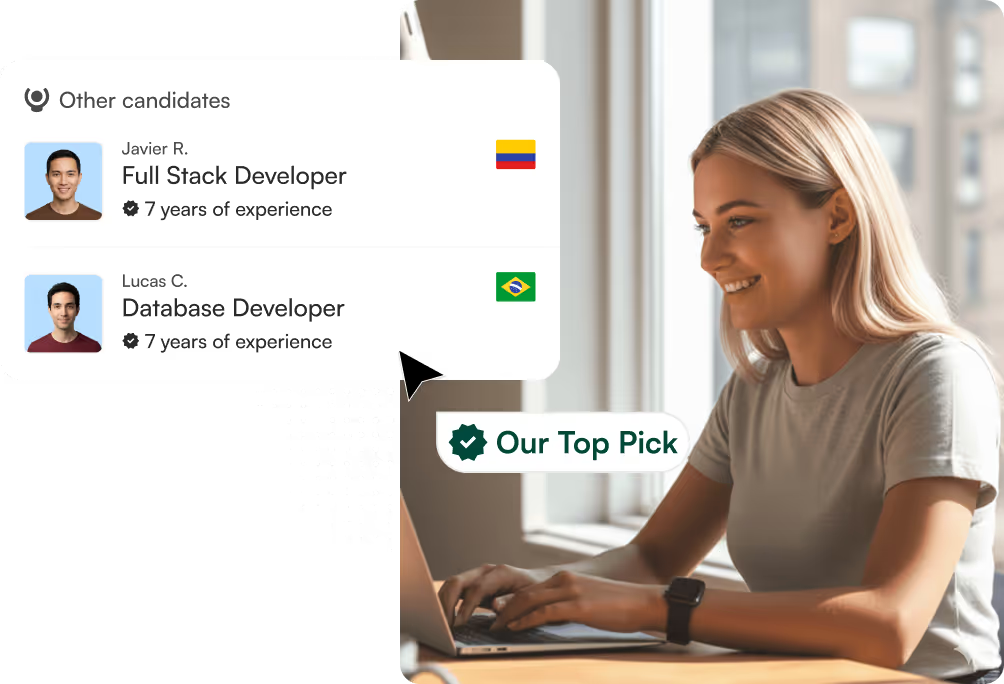Top 10 AI Recruitment Tools Transforming Hiring in 2026


Lupa will help you hire top talent in Latin America.
Book a Free Consultation
Lupa helps you build, manage, and pay your remote team. We deliver pre-vetted candidates within a week!
Book a Free ConsultationThe recruitment landscape is undergoing a profound transformation, with artificial intelligence leading the charge. According to a recent BCG survey, 70% of companies experimenting with AI are doing so within HR departments, with talent acquisition being the primary use case. This shift isn't surprising, as ai recruitment tools are revolutionizing traditional hiring processes by automating repetitive tasks, improving candidate matching, and enhancing the overall hiring experience.
The impact of these tools is substantial—92% of firms report benefits from AI-driven implementation in HR, with 10% experiencing productivity gains exceeding 30%. These technologies are helping recruiters and hiring managers access wider talent pools, improve screening capabilities, and significantly reduce administrative workload.
However, it's crucial to understand that while AI offers tremendous benefits, human oversight remains essential. The most successful organizations view AI as augmenting human recruiters rather than replacing them. In this article, we'll explore the top 10 ai recruitment tools transforming hiring, examining their features, benefits, and how they're reshaping the recruitment process.
How AI is Transforming the Recruitment Landscape
The recruitment industry has traditionally been labor-intensive, with recruiters spending countless hours on administrative tasks like resume screening, candidate outreach, and interview scheduling. AI is fundamentally changing this paradigm by automating these repetitive processes and allowing recruiters to focus on more strategic aspects of talent acquisition.
One of the most significant advantages of using AI in recruitment is the ability to process vast amounts of data quickly and efficiently. AI-powered systems can analyze thousands of resumes in minutes, identifying potential candidates who best match job requirements based on skills, experience, and potential cultural fit. This capability enables recruiters to access much wider talent pools than would be possible through manual methods.
AI is also transforming candidate engagement through intelligent chatbots and automated communication systems. These tools can answer candidate data questions, provide updates on application status, and even conduct initial screening interviews, all while maintaining a personalized touch. This improves the candidate experience while freeing up recruiters' time for more complex tasks.
Furthermore, AI algorithms are helping reduce bias in hiring decisions by focusing on objective criteria rather than subjective impressions. By standardizing the evaluation process and highlighting relevant skills and experiences, AI recruitment tools can help organizations build more diverse and inclusive teams.
Key Benefits of AI Recruitment Tools
The adoption of ai recruitment tools offers numerous advantages for organizations looking to optimize their hiring processes:
Time Savings Through Automation
According to BCG data, 70% of companies have adopted AI for automating administrative recruitment tasks. This automation significantly reduces the time recruiters spend on resume screening, candidate sourcing, and scheduling interviews. What once took days or weeks can now be accomplished in hours, allowing recruitment teams to focus on building relationships with top candidates and making strategic hiring decisions.
Improved Candidate Matching
With a 54% adoption rate, AI-powered candidate matching is revolutionizing how organizations find the right talent. These systems use sophisticated algorithms to analyze job requirements and candidate profiles, identifying the best matches based on skills, experience, and potential. This leads to higher quality hires and better retention rates, as the best candidates are more likely to succeed in roles that align with their capabilities.
Enhanced Candidate Experience
AI tools are transforming the candidate experience through personalized communication, timely updates, and streamlined application processes. Chatbots can provide immediate responses to candidate inquiries, automated systems can keep applicants informed about their status, and AI-powered assessments can offer a more engaging and relevant evaluation experience. These improvements help organizations attract and retain top talent in competitive markets.
Reduced Bias in Hiring Decisions
By focusing on objective criteria and standardizing evaluation processes, AI tools can help reduce unconscious bias in hiring decisions. These systems evaluate candidates based on their qualifications and potential rather than subjective impressions, leading to more diverse and inclusive teams. However, it's important to note that AI systems must be carefully designed and monitored to ensure they don't perpetuate existing biases.
Data-Driven Insights for Better Decision-Making
AI recruitment platforms provide valuable analytics and insights that help organizations optimize their hiring strategies. These tools can identify bottlenecks in the recruitment process, track key metrics like time-to-hire and cost-per-hire, and provide recommendations for improvement. This data-driven approach enables more strategic decision-making and continuous optimization of the recruitment process.
Top 10 AI Recruitment Tools for 2026
1. Workable
Workable stands out as a comprehensive AI-powered applicant tracking system (ATS) that streamlines the entire recruitment workflow. Its AI capabilities include advanced resume parsing, automated candidate screening, and intelligent matching algorithms that identify the most qualified candidates for each position.
One of Workable's standout features is its AI-powered video interview functionality, which analyzes candidate responses and provides insights to help recruiters make more informed decisions. The platform also offers customizable workflows, allowing organizations to tailor the recruitment process to their specific needs.
Workable integrates seamlessly with popular HR systems and job boards, making it easy to incorporate into existing tech stacks. Its pricing is based on hiring volume, making it suitable for mid-sized companies looking for an all-in-one recruitment solution that leverages the power of AI to enhance every stage of the hiring process.
2. Paradox
Paradox has revolutionized the recruitment landscape with its AI assistant, Olivia, which provides a conversational interface for candidates and recruiters. This chat-based recruitment tool excels in high-volume and hourly hiring scenarios, automating scheduling, screening, and candidate communication with remarkable efficiency.
Olivia can engage with candidates 24/7, answering questions, collecting information, and scheduling interviews without human intervention. This significantly improves the candidate experience while reducing the administrative burden on recruiters. The platform's conversational AI is sophisticated enough to provide personalized interactions that feel natural and engaging.
Paradox has demonstrated particular success in industries with high turnover and constant hiring needs, such as retail, hospitality, and healthcare. Its ability to handle large volumes of candidates while maintaining a personalized touch makes it an invaluable tool for organizations with substantial hiring requirements.
3. Eightfold
Eightfold stands out as an intelligent talent acquisition platform powered by a sophisticated AI matching engine. What sets Eightfold apart is its focus on skills and potential rather than just experience, enabling organizations to identify candidates who may not have traditional backgrounds but possess the capabilities to excel.
The platform uses deep learning to understand the relationships between skills, roles, and career trajectories, allowing it to make nuanced recommendations about candidate suitability. This approach helps organizations build diverse talent pipelines and improve internal mobility by identifying employees who could grow into new roles.
Eightfold's AI continuously learns from hiring outcomes and career progressions, becoming more accurate over time. The platform integrates with existing HR systems and provides comprehensive analytics to help organizations understand and optimize their talent strategies. Its focus on potential makes it particularly valuable for forward-thinking companies committed to skills-based hiring and employee development.
4. Manatal
Manatal has emerged as a budget-friendly ATS with powerful AI capabilities, making sophisticated recruitment technology accessible to smaller organizations. Its AI scoring system automatically evaluates candidates against job requirements, helping recruiters quickly identify the most promising applicants.
The platform features intuitive drag-and-drop pipelines that make it easy to visualize and manage the recruitment process. Its social media recruitment features leverage AI to find and analyze candidate profiles across various platforms, providing a more comprehensive view of each applicant.
Manatal is particularly well-suited for smaller, high-growth companies that need sophisticated recruitment tools without enterprise pricing. Its user-friendly interface requires minimal training, allowing teams to quickly implement and benefit from AI-powered recruitment without extensive onboarding or technical expertise.
5. HireVue
HireVue has pioneered the use of AI in video interviews, offering a platform that analyzes candidate responses, facial expressions, and language patterns to provide insights beyond traditional interviews. This technology helps organizations evaluate soft skills and cultural fit in a more objective and consistent manner.
The platform's pre-employment assessment features use game-based evaluations and situational judgment tests to predict job performance more accurately than traditional methods. These assessments are designed to be engaging for candidates while providing valuable data for hiring decisions.
HireVue has invested significantly in addressing concerns about bias in AI video analysis, implementing rigorous testing and continuous improvement of its algorithms. The platform offers a range of customization options, allowing organizations to tailor the interview and assessment process to their specific requirements while maintaining consistency across all candidates.
6. Textio Loop
Textio Loop specializes in creating inclusive job postings through AI-powered language analysis. The platform identifies potentially biased or exclusionary language in job descriptions and suggests alternatives that appeal to a broader range of candidates.
By analyzing patterns in language and their impact on application rates, Textio helps organizations attract more diverse candidate pools. The platform provides real-time feedback as job descriptions are written, making it easy to create inclusive content without extensive training or expertise.
Organizations using Textio have reported significant improvements in diversity metrics and application rates. The platform's focus on inclusive language makes it a valuable tool for companies committed to building diverse teams and creating an inclusive workplace culture.
7. hireEZ
hireEZ (formerly Hiretual) is a powerful AI-powered candidate sourcing platform that helps recruiters proactively find passive candidates across multiple platforms. Its AI technology can search through billions of profiles across the web, identifying candidates with the right skills and experience for specific roles.
The platform's automated outreach features enable recruiters to engage with candidates at scale, personalizing messages based on candidate profiles and interests. Its diversity sourcing tools help organizations build more inclusive talent pipelines by identifying candidates from underrepresented groups.
hireEZ integrates with popular ATS systems, allowing recruiters to seamlessly transfer candidate information and track engagement. Its focus on outbound recruiting makes it particularly valuable for organizations hiring for specialized roles or in competitive markets where active candidates are scarce.
8. Zoho Recruit
Zoho Recruit offers a value-focused AI recruitment solution that integrates seamlessly with the broader Zoho ecosystem. Its AI capabilities include resume parsing, candidate matching, and automated workflows that streamline the recruitment process from end to end.
The platform serves different types of recruiters, with specialized features for corporate HR teams, staffing agencies, and temporary workforce management. Its customization capabilities allow organizations to tailor the recruitment process to their specific needs and industry requirements.
Zoho Recruit's integration with other Zoho applications provides a comprehensive solution for organizations looking to manage the entire employee lifecycle, from recruitment to onboarding and beyond. Its competitive pricing and robust feature set make it an attractive option for organizations seeking value without compromising on functionality.
9. Skillate
Skillate focuses on recruitment process automation through AI-powered resume screening, candidate ranking, and workflow automation. Its intelligent matching algorithms analyze job descriptions and candidate profiles to identify the most suitable applicants, significantly reducing time-to-hire.
The platform's automated workflows eliminate manual tasks and ensure consistent processes across all hiring initiatives. Its analytics capabilities provide valuable insights into recruitment effectiveness, helping organizations identify bottlenecks and opportunities for improvement.
Skillate's emphasis on process efficiency makes it particularly valuable for organizations with high-volume hiring needs or those looking to standardize their recruitment processes across multiple departments or locations. Its ability to learn from hiring outcomes ensures continuous improvement in candidate matching and selection.
10. Teamtailor
Teamtailor distinguishes itself by focusing on attracting and converting talent through a comprehensive platform that combines ATS functionality with employer branding features. Its AI helps improve conversion rates at each stage of the recruitment funnel, from initial awareness to final hiring decision.
The platform's career site builder allows organizations to create engaging, branded career pages that showcase their culture and values. Its candidate relationship management capabilities enable personalized communication and nurturing of talent pools over time.
Teamtailor's collaborative features facilitate team-based hiring decisions, allowing multiple stakeholders to provide input and feedback throughout the recruitment process. This approach ensures better alignment between hiring managers, recruiters, and other team members, leading to more successful hires and improved retention.
Implementation Considerations and Best Practices
While ai recruitment tools offer significant benefits, successful implementation requires careful planning and ongoing management. Here are key considerations for organizations looking to leverage AI in their recruitment processes:
Maintain Human Oversight
As emphasized in BCG's research, organizations should adopt a "Be human first" approach when implementing AI recruitment tools. Human judgment remains essential for evaluating nuanced aspects of candidate suitability, such as cultural fit and soft skills. AI should be viewed as augmenting human recruiters rather than replacing them, with final decisions remaining in human hands.
Develop a Candidate-First Mindset
The most successful implementations of AI recruitment tools prioritize the candidate experience. Organizations should ensure that automation enhances rather than detracts from candidate interactions. This includes providing clear information about how AI is used in the recruitment process, offering alternatives when needed, and maintaining personal touchpoints throughout the candidate journey.
Monitor the Regulatory Environment
The regulatory landscape surrounding AI in hiring is evolving rapidly. Organizations must stay informed about relevant regulations such as the California Consumer Privacy Act and the EU AI Act, which impose requirements on how AI can be used in recruitment. Implementing governance frameworks and regular audits can help ensure compliance with current and emerging regulations.
Invest in Recruiter Training
For AI recruitment tools to deliver maximum value, recruiters must understand how to use them effectively. This includes training on system capabilities, interpretation of AI-generated insights, and when to override automated recommendations. Organizations should view this training as an investment in developing new skills rather than replacing existing ones.
Set Proper Expectations
Organizations should set realistic expectations about what AI can and cannot do in the recruitment process. While AI can significantly improve efficiency and provide valuable insights, it is not a magic solution that eliminates all challenges. Clear communication about the role of AI and its limitations helps ensure that stakeholders have appropriate expectations.
Address AI Bias Concerns
All AI systems have the potential to perpetuate or amplify existing biases if not carefully designed and monitored. Organizations should implement regular audits of AI recruitment tools to identify and address potential bias. This includes analyzing hiring outcomes across different demographic groups and making adjustments to algorithms or processes as needed.
Ensure Smooth Transition
Transitioning from traditional recruitment processes to AI-powered approaches requires careful change management. Organizations should implement new tools gradually, provide adequate support during the transition, and collect feedback from both recruiters and candidates to identify and address any issues that arise.
Future Trends in AI Recruiting Software
The field of AI recruitment is evolving rapidly, with several emerging trends poised to shape the future of talent acquisition:
Advanced Natural Language Processing
Improvements in natural language processing (NLP) will enable more sophisticated analysis of candidate communications, from application materials to interview responses. These advancements will allow AI recruitment tools to better understand nuanced aspects of candidate suitability, such as communication style, problem-solving approach, and cultural alignment.
Predictive Analytics for Talent Planning
AI-powered predictive analytics will increasingly help organizations anticipate future talent needs and identify potential skill gaps before they become critical. These capabilities will enable more proactive recruitment strategies, allowing organizations to build talent pipelines aligned with long-term business objectives.
Enhanced Personalization
Future AI recruitment tools will offer even greater personalization of the candidate experience, tailoring interactions based on individual preferences, career goals, and communication styles. This personalization will extend throughout the recruitment process, from initial outreach to onboarding, creating a more engaging and relevant experience for candidates.
Ethical AI Frameworks
As concerns about AI bias and fairness continue to grow, we'll see the development of more robust ethical frameworks and standards for AI in recruitment. These frameworks will provide guidelines for the responsible use of AI in hiring decisions and help organizations ensure that their AI systems promote rather than hinder diversity and inclusion.
Integration of Virtual Reality
Virtual reality (VR) technology will increasingly be integrated with AI recruitment tools to create immersive assessment and onboarding experiences. These experiences will allow candidates to demonstrate skills in realistic simulations while providing organizations with richer data for evaluation and selection.
Continuous Learning Systems
Next-generation AI recruitment tools will feature more sophisticated continuous learning capabilities, improving their accuracy and effectiveness over time based on hiring outcomes and performance data. These systems will adapt to changing job requirements, market conditions, and organizational needs, providing increasingly valuable insights for recruitment decisions.
Ready to Transform Your Recruitment Process with Premium Talent?
While AI recruitment tools offer powerful capabilities, the human element remains crucial for truly strategic hiring. At Lupa, we combine cutting-edge technology with deep human expertise to connect US companies with premium LatAm talent that's fully aligned on timezone, culture, and work ethic.
Unlike generic recruiters focused on volume, Lupa delivers quality-first recruitment that ensures you find the right candidates the first time. Our consultative approach means we become an extension of your team, handling everything from sourcing to offering with white-glove service that respects your time and priorities.
If you're tired of sifting through misaligned candidates and want a strategic partner who understands your business needs, book a discovery call today. Let's build your dream team with talent that doesn't just fill positions but drives your business forward.

"Over the course of 2024, we successfully hired 9 exceptional team members through Lupa, spanning mid-level to senior roles. The quality of talent has been outstanding, and we’ve been able to achieve payroll cost savings while bringing great professionals onto our team. We're very happy with the consultation and attention they've provided us."


“We needed to scale a new team quickly - with top talent. Lupa helped us build a great process, delivered great candidates quickly, and had impeccable service”


“With Lupa, we rebuilt our entire tech team in less than a month. We’re spending half as much on talent. Ten out of ten”






















